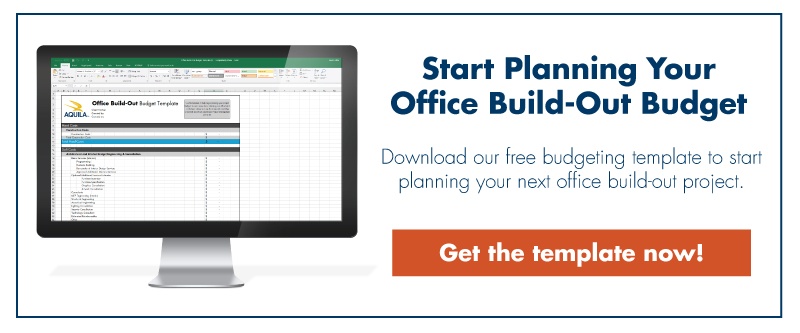Starting a new commercial construction project can be stressful and tumultuous work, especially if you aren’t experienced in design and construction. Understanding commercial construction costs can also be daunting. As with any large project, it’s easy for things to get out of hand and fall behind schedule, which typically ends up costing you more time, money, and sleep than you originally expected.
At AQUILA, we understand the importance of starting a new build-out and want to help you find ways to stay on budget.
In this article, we discuss three of the best ways to do this successfully, including:
- Being prepared
- Value engineering
- Hiring a project manager
1. Being Prepared for Your Commercial Construction
If there’s one thing I learned in my days as a Boy Scout, being prepared can help you avoid pitfalls, or at least be equipped to handle problems as they arise. When it comes to office build-outs the same logic applies.
Planning the Space
There are many layers to the construction process that must be understood to stay on budget. For this reason, it is imperative that the design and planning portion of the project starts as early as possible. The quicker you can begin your space planning and leasing activities like test fits, creating market surveys, financial analyses, and construction decisions, the better off you’ll be in the long run. Getting those activities started early spreads out your timeline and decreases the impact of an unexpected delay, reducing the risk of an unforeseen problem derailing the entire build-out process.
One common aspect of the build-out process that can be required and can potentially cause delays is the permitting process. Filing for and waiting on permits is not only time-consuming but can also be expensive, especially if your permit is denied and you have to start over with the design process from scratch. By planning ahead and understanding potential issues like this well in advance, you will be much more likely to remain within your budget.
Choosing the Right Team for Your Construction Project
In most cases, you will be working with a large team of contractors, specialty trades, consultants, and vendors that need to be chosen carefully. Inexperience could be costly, so it is in your best interest to fully research each option, keeping in mind that the cheapest bid might not always be the best.
One tip for evaluating proposals is to start by asking previous clients for testimonials. This is a great way to hear firsthand how a contractor performed previously and if they could be a good fit for you and your project. You should also visit example build-outs that they worked on previously to see if it aligns with what you’re looking for in your own space.
A project manager would normally handle this process for you, but if you decide not to hire one it is imperative to watch for common problem areas like general personality differences or companies that submit large quantities of change orders. These deviations can become time-consuming and draw manpower away from the project. Ultimately, you want to choose trustworthy partners that make your life easier and will keep the project flowing along nicely.
Understanding the Market
Understanding current market conditions and factors is another important aspect of being prepared for your build-out. The construction economy has changed enormously over the last 10 years, and Austin’s market is at the forefront of these changes. By leveraging up-to-date information and resources, you can avoid surprises and make sure your build-out expenses are in-line with the market.
For example, labor supply is an important but often overlooked factor that can impact the cost of a build-out. In the case of a labor shortage, you could end up with an understaffed crew working on a big project with a tight timeline, which can get expensive and be less efficient compared to a properly staffed team. Other factors, like the average TI allowance, generally agreed to by landlords for similar spaces in your market, are also important to understand in advance, so taking the time to do your due diligence is well worth the effort.
This type of market-level knowledge will help you create a more accurate budget for your project. Still, there is always the potential for variation so it is also recommended that you include a contingency allowance in your budget for unexpected expenses. This allowance acts as your financial safety net, providing a built-in resource and funds in case expenses are more than you anticipated. The amount budgeted is dependent on the size of the project, but typically it shouldn’t exceed 10% of the overall project cost.

A qualified project manager will help you understand the market and be able to walk you through this process.
2. Use Value Engineering to Reduce Commercial Construction Costs
Value engineering is the process of finding an alternate solution for your build-out that will achieve the same effect while reducing commercial construction costs. You can save money on materials, means, and methods while also maintaining as much of the original plan and intended effect as possible. This can be done in a variety of ways, including choosing less expensive materials for your carpet, countertops, and glass, or using wireless internet instead of wired connections. Overall, the most important questions to ask yourself are: Where do I really need to focus on spending money to achieve the desired effect? Where do my dollars get the most bang for their buck?
Value engineering can help keep your project on track by focusing a larger portion of the budget on conference rooms, offices, and other important areas of the office where you might interact with clients, and less on the non-client facing spaces like a mailroom. Not only can value engineering help you keep your build-out under budget, but it’s also a great way to make adjustments to your project on the fly without having to completely re-evaluate your design or budget.
If you choose to hire a project manager, they will have valuable existing connections with contractors and can rely on previous experience to get you through this process. Although revisions seem intimidating, this is not the time to panic. Project managers deal with value engineering regularly and are always thinking of ways to save their clients money.
To learn more about how you can apply value engineering, read our article Value Engineering: Definition & How to Save Money on Office Build-Outs
3. Hiring a Project Manager for Your Commercial Construction Project
Whether your project is just beginning, halfway finished, or nearing completion, a project manager can serve as a vital member of your team.
Managing a construction project is not an easy task, especially when you have to deal with the normal day-to-day operations of your company. In general, a project manager acts as your eyes and ears in the field and deals with everything from planning and design, budgeting, and construction management to organization, scheduling, and move-in so you can stay focused on your business goals.
These skilled professionals have vital information and strong relationships with engineers, vendors, consultants, general contractors, and other professional service providers in their market. They have vetted these contacts through years of shared experience and teamwork, so you can rest easy knowing that you have the best team for the job.
Your project manager will also help develop the scope of your project, keep you up to date on the building process and inform you when problems arise. When this happens, they will discuss strategy and relay information to your team through progress meetings and updates along the way. Seasoned project managers have likely encountered the same or similar problems before and can rely on past experience and expertise to soften the blow and get everything back on track quickly.
By using an experienced project manager, your project is much more likely to not only stay under budget but be completed faster and more efficiently while also leaving you free to manage the day-to-day operations of your business. A project manager also probably doesn’t cost what you would expect, and they almost always create value in excess of their fee.
To learn more about what a project manager can do for you, read our article What is a Project Manager & How Can They Help Manage My Office Build-Out?
Conclusion
We hope this article gave you a better understanding of how to keep your commercial construction costs on budget. We understand that handling a project of any size can seem overwhelming on top of your regular business activities, and we recommend utilizing the expertise of a project manager as early as possible.
Read Now: Cost to Hire a Project Manager for an Office Build-Out or Renovation
If you would like to discuss ways to save money on your commercial construction costs or would like to learn more about the project budgeting process, visit our project management page or schedule a consultation with our team.













